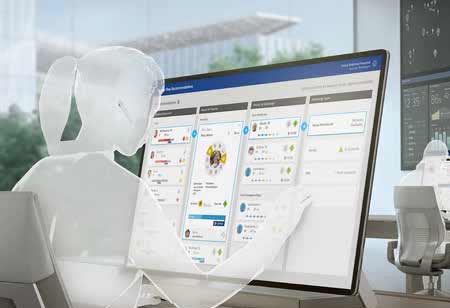Thank you for Subscribing to Healthcare Business Review Weekly Brief

Workforce Pipeline Securing New Zealand's Medical Future
Healthcare Business Review
Jonathan Albrett brings extensive expertise to his role as Director of Clinical Training at Te Whatu Ora Taranaki. A 2002 graduate of the University of Auckland Medical School, he holds fellowships from the Australian and New Zealand College of Anaesthesia, as well as the College of Intensive Care Medicine of Australia and New Zealand.
Dr. Albrett specializes in anesthesia and intensive care medicine. He is passionate about medical education, guiding both medical students and prevocational doctors. His interests include medical transport, simulation, deteriorating patient care, and sleep medicine.
Dr. Albrett's commitment to clinical training fosters the development of the next generation of skilled medical practitioners in New Zealand.
Through this article, Albrett shares his insights on the challenges and opportunities facing clinical training in New Zealand. He discusses the evolving healthcare landscape, strategies for developing a skilled medical workforce and the role of initiatives and technological advancements in shaping the future of medical education.
As a leader involved in clinical training, what are the most significant challenges you see in the sector today?
The healthcare sector faces significant challenges. Increasing graduate numbers coincide with complex cases and busy work environments, requiring young doctors to navigate chronic diseases, treatment options, and aging populations.
Newly qualified doctors often have strong understandings of inequities and bias, contrasting with senior practitioners. This creates a dynamic learning environment where even experts can benefit from trainees' insights, requiring adjustment on all sides.
There's a disconnect between idealistic university expectations and practical workplace realities, causing a jarring transition for junior doctors.
The pandemic's impact on learning cannot be ignored, as doctors trained during this period may have less hands-on experience, necessitating a focus on rebuilding teamwork skills.
Younger staff may not fully grasp the impact of changing governance structures, which can create insecurity among senior leaders with consequences for junior professionals.
Could you talk about recent initiatives or technological advancements aiding the challenges faced in clinical training?
In New Zealand, we've seen positive developments with a nationwide network of educators. Most hospitals now have dedicated Directors of Clinical Training, including myself in the Taranaki region. This network fosters ongoing consultation, sharing of strategies, and collaborative problem-solving.
Looking ahead, I anticipate a strong emphasis on workforce pipeline development over the next two years, through specialty and national initiatives. The aim is to develop and integrate more domestic graduates into the healthcare system, ensuring high-quality positions with excellent training and supervision.
The establishment of national specialty networks is another promising development. These will focus on expanding training workforces, leading to streamlined, accessible pathways for trainees and facilitating timely graduation.
While AI has not yet seen mainstream use in junior doctor training, I believe it will become a significant component within the next couple of years.
Could you elaborate on the potential long-term benefits you see for the medical field, maybe a few years down the line?
The establishment of a workforce pipeline over the next two years promises significant long-term benefits. Graduating doctors should have a clearer vision of their career trajectories, encouraging more to stay in New Zealand and potentially attracting talent from abroad.
One area with immense potential is the training of general practitioners (GPs). My involvement in a pilot program demonstrated the power of early community exposure, as doctors placed directly into general practice settings are more likely to remain in that field, addressing the looming GP shortage.
I foresee a shift towards community-based medical training, moving beyond the traditional hospital-centric model. This could factor into the development of a third medical school, with more doctors opting for general practice from the start. As community work becomes more appealing, hospitals may need to offer more attractive terms to compete for graduates, empowering young doctors with greater choice and flexibility - a positive development for the sector.
Would you be willing to share some stories about those who've had the most influence on your development?
Throughout my career, I've had the privilege of observing truly exceptional leaders in action. Early on, as a new fellow representative on a New Zealand committee, I witnessed senior members like Ross Freeburn navigate negotiations, quality control, and interactions with other groups with remarkable skill, presenting compelling arguments and achieving their goals with integrity.
“By providing certainty and support within New Zealand, we’ll encourage more to stay and potentially attract those from abroad.”
My experience on the Medical Council's education committee offered further opportunities to learn from extraordinary leaders. George Knaysi, Curtis Walker, and King Clark exemplified effective leadership, empowering team members, validating their contributions, and fostering their professional growth, while prioritizing the development of others over seeking personal recognition. These experiences had a profound impact on shaping my own leadership style, emphasizing collaboration and bringing out the best in those around me.
What advice would you offer to those looking to excel in clinical training?
Clinical training requires patience above all. Understand that the essence of medicine is in its practice, where hands-on experience is invaluable over time. My advice is to embrace patience and recognize that excellence in medicine is a marathon, not a sprint, though the rewards are fulfilling.
Medical training involves an intense focus on your own progress, exams, and qualifications, requiring self-centeredness. But the art of medicine transforms once you've crossed that threshold, with a shift from individual achievements to collective success. You'll need to learn how to be an effective team player, leverage those around you, and contribute to a collaborative environment.
The future of medicine isn't about solo brilliance, but how well you work within a team and contribute to collective expertise. It's a balance of pushing yourself to learn and grow, then shifting to foster success in a team setting.









